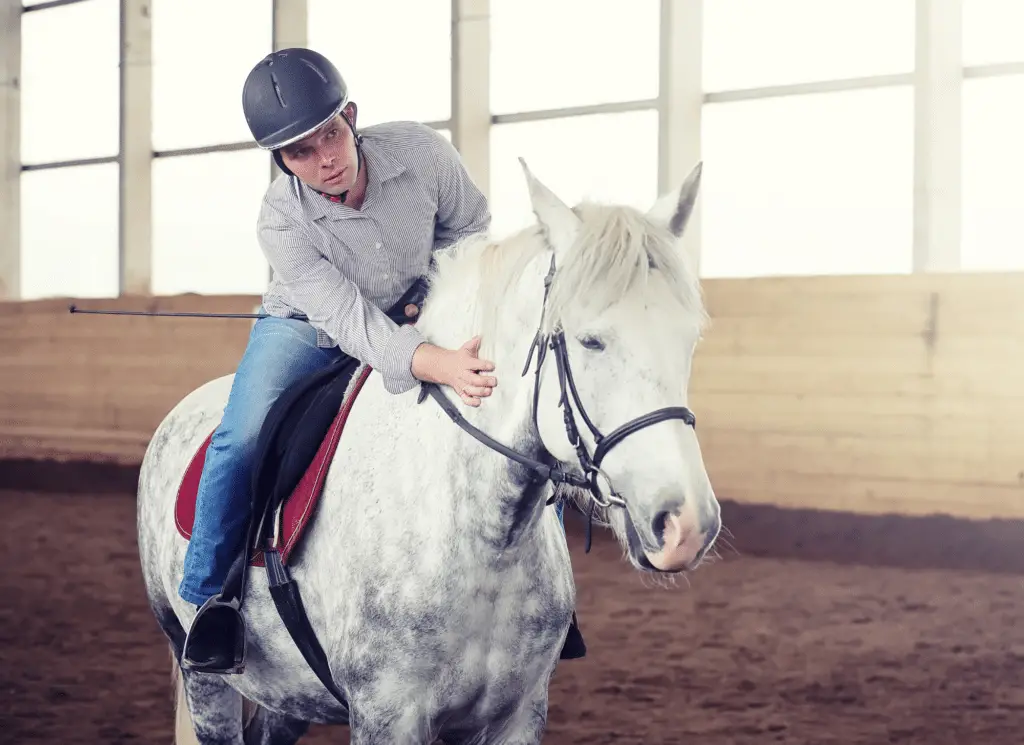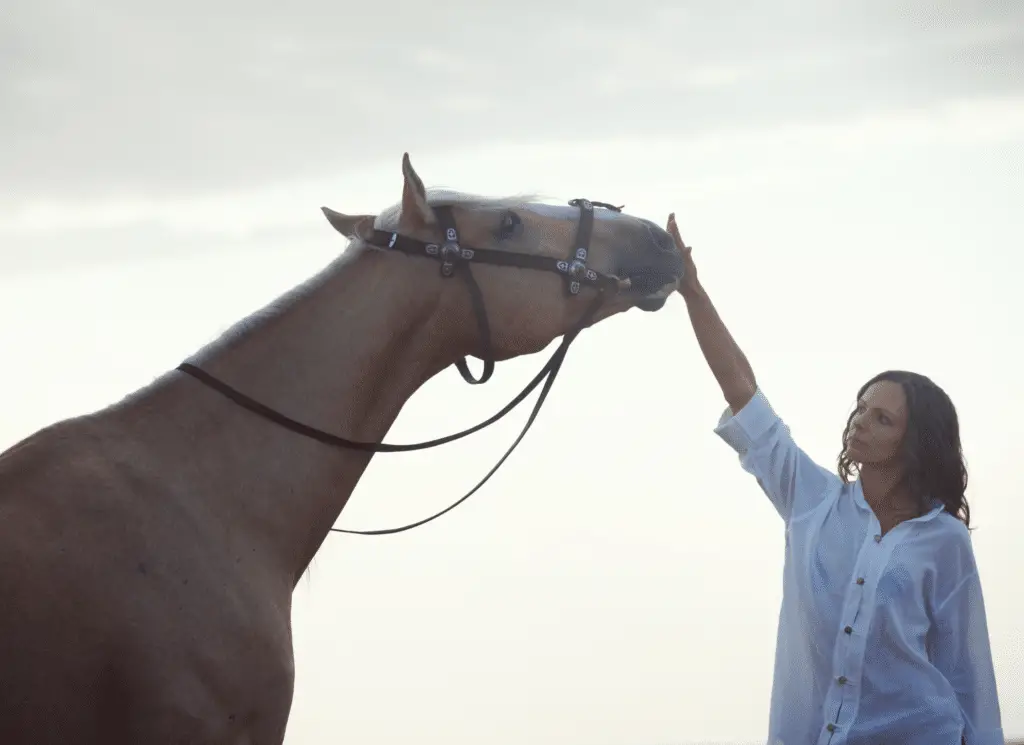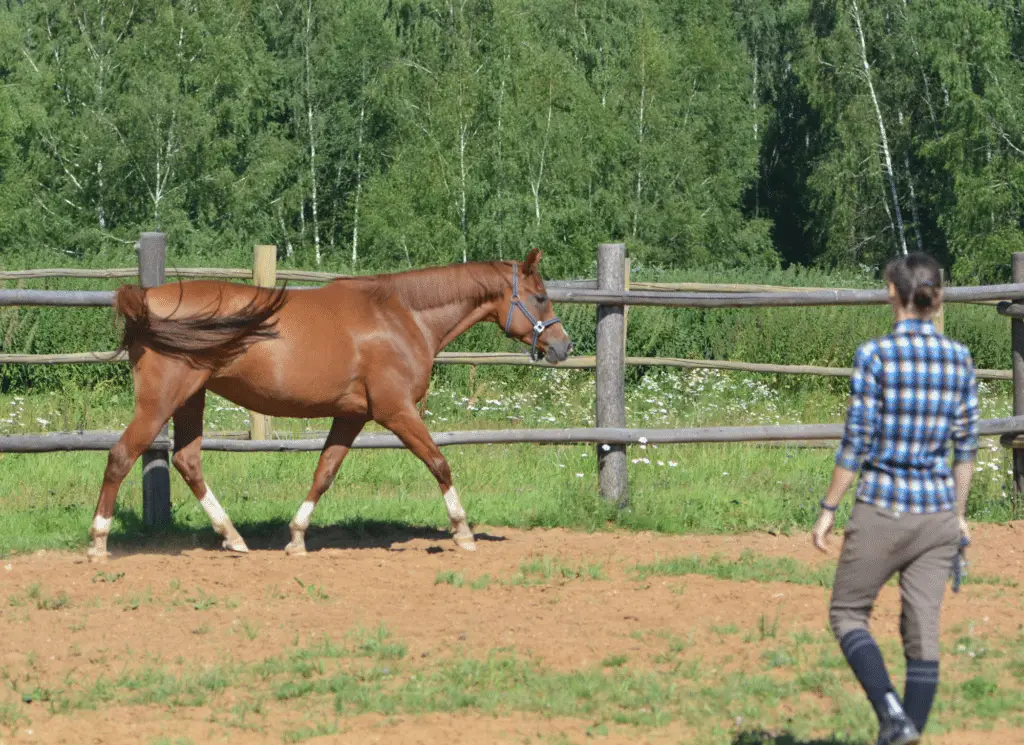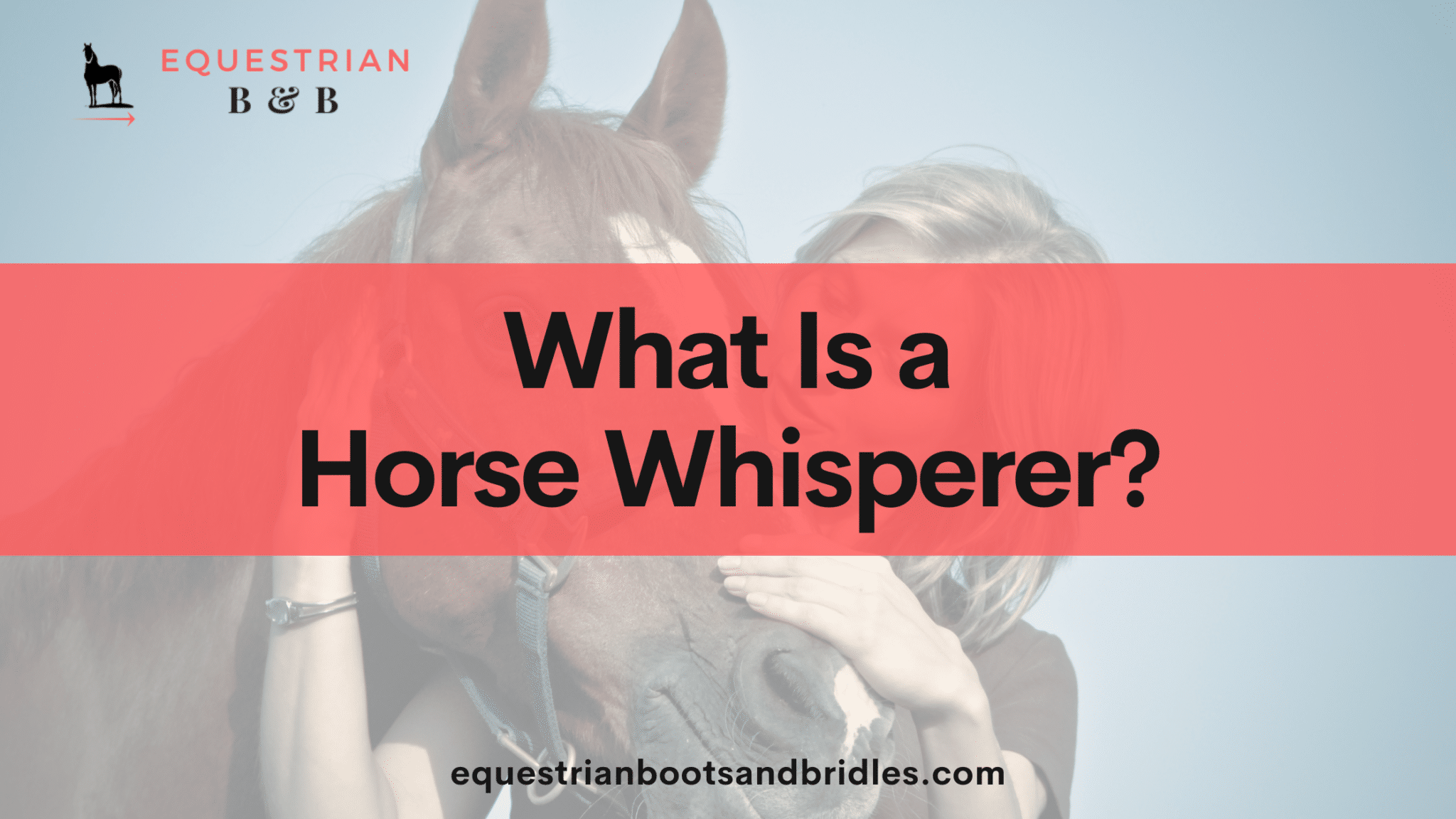There isn’t a horse owner alive who hasn’t heard about the almost mythical profession of a horse whisperer. And if you’ve never seen one in action, you’ve probably got The Horse Whisperer in your movie collection (next to Black Beauty and Seabiscuit).
I had the opportunity of working with a genuine horse whisperer recently, and the experience left me quite humbled and inspired as I marveled at the change in the horse being treated. Since I learned what a horse whisperer does, I wondered if I could perhaps become one and whether it was a viable career option for someone who wants to work with horses.
What Is a Horse Whisperer?
A horse whisperer is someone who has learned how to communicate with horses on a deeper level than merely pulling a lead rope or chasing them with a whip. Instead of telling the horse what to do, a horse whisperer listens to the horse, reading their body language while picking up on their energy signals.
The horse’s body language can reveal a lot about their feelings, thoughts, instincts, and experiences if you listen carefully to these signals. I asked the horse whisperer I worked with what was the difference between what they did and what an experienced horse trainer did.
Where a traditional horse trainer would force or break a horse to teach them to accept a rider and submit to their owner’s will, a horse whisperer would rather listen, communicate, and build a bond between the animal and the person riding them for a harmonious partnership without force or abuse.
Of course, not all traditional horse trainers are abusive toward their horses, but for the horse whisperer, meaning is built through trust.
What Does a Horse Whisperer Do?
A horse whisperer is essentially a horse trainer who listens to the horse more than telling them what to do. Using a variety of techniques and interactions, the whisperer will pick up signals and information from the horse, reading them and listening to the horse’s body language as the horse tells them what they are upset about.
When working with horses, it’s essential to develop so called “horse sense,” which helps the rider effectively communicate by first listening, then negotiating (never forcing) the horse to accept their task.
So, a horse whisperer is someone who comes to see your horse when the horse has behavioural problems and for training young horses. The relationship they build with your horse is a crucial part of the rider-horse relationship.
Whether the horse whisperer is simply standing at the center of the round pen or drawing the horse forward with their energy, they bring a new level to training horses and may help you develop riding horses that are different from other horses that are shut down and unheard. With the help of a horse whisperer, you can create a true and lasting partnership with your horse.
How Does One Become a Horse Whisperer?
Being a horse whisperer is a skill you can only develop by learning from another great horse person and from spending as much time around horses as possible.
While there are a few horsemanship courses out there that proclaim to help you become a horse whisperer, it’s something that can’t simply be learned from a few books or a couple of videos on YouTube.
Training with a horse whisperer is perhaps the only way to learn the skills needed to listen to your horse and know what they need. A talented horse whisperer can explain what they look for in the horse’s body language, their movement, and their energy to speak to them. Without that in-person training, it’s hard to become the best horse whisperer you can be.
Horse Whisperer vs Horse Psychologist
The term horse whisperer is much older than some of the newer horse-training terms that have become popular, and some people today use the term horse psychologist interchangeably with horse whisperer. However, the two terms don’t quite match up.
A horse psychologist is someone who has studied psychology and animal behavior. This person knows about things like herd dynamics, the basic needs of an animal such as a horse, and how to assert leadership in the herd situation using the same methods as another horse would.
While a horse psychologist will use the same approach as another horse, they don’t necessarily consider all the finer signals a horse can whisper when they have been placed in unnatural situations where they suffered abuse, trauma, and pain. This is not to say that a horse psychologist and a horse whisperer can’t work together.
In fact, when you know the psychology of horses, it can help you be a better horse whisperer, as long as you don’t forget to let the horse talk to you, instead of trying to make the textbook fit the horse.

A Horse Whisperer at Work: What a Session Looks Like
So what does a session with a horse whisperer look like? Just like a medical doctor, a horse whisperer may ask for a case history about the horse they are treating (which is why they often use the term clinician).
Usually, they will spend a while studying the horse, noting the way the horse moves and reading (or listening) for information from a number of cues such as when the horse carries their head low, tightens their mouth, stamps their hooves, or flattens their ears.
The horse’s breathing rate, blowing breath through their mouth, and facial expressions all help tell the horse whisperer what’s going on with your horse.
Some horse whisperers will use a round pen and lead to move the horse’s feet, getting the horse to mentally join them and begin negotiating about what’s going on with the horse. When the horse will stand and appear calm, with their head low, the horse whisperer may copy the horse’s body language and act the same way. Building understanding and helping the horse feel comfortable are essential elements to help train the horse.
With great patience, the horse whisperer will let the horse set the pace of their connection, while paying close attention to the horse for signs of pain or poor ability that may need the services of a vet to give the horse a checkup too.
With repetition and an open mind, the horse can be trained in the correct way of going while still honoring the horse’s previous experience with humans (which may not have been good).
Each horse whisperer works differently to other trainers. Their experience with horses and their life with these magnificent animals will contribute to how they approach the horse and how they set about creating the training routine.
Some horse whisperers use modern equine psychology or their experience with other animals that have also been traumatized to help settle unruly horses and comfort abused horses so the horse can trust humans again.
Only by working with horses can a sound basis of trust be established that will help you produce a safe riding partner in your horse. Sometimes it is necessary to track down the horse’s previous owner to get more information on what the horse has experienced. Most horses respond well to the horse whisperer’s nonverbal communication without having to go to such extreme measures.
So in a nutshell, a horse whisperer will:
- Work the horse in the round pen, watching the horse for signs and reading their body language
- Effectively communicate with the horse, using other signs like posture, energy, and sound to send the horse away or invite them into their personal space
- Fit an untrained horse with their first saddle, work them from the ground, and progress to riding the horse
- Set the horse up for life with humans and help them adjust to life at the barn
When to Use a Horse Whisperer (Typical Problems They Treat)
I chose to work with a horse whisperer in dealing with my horse’s biting issues, which stemmed from a previous owner’s poor handling of her young horses.
There are many other issues a horse whisperer may help with, such as:
- Aggression
- Bucking
- Rearing
- Fear of specific items
- Buddy sourness
- Failure to load into the horse float
- Inability to lead softly or quietly
- Pulling and running off
- And more
Being a Horse Whisperer: Have You Got What It Takes?
Watching the real thing in reality is quite inspiring when it comes to horse whisperers. After seeing the professional in action, I wondered if I have what it takes to become a professional horse whisperer. Perhaps you do too?
To make a successful career at authentic horse whispering, you will need the following characteristics:
- Patience for the long run
- Understanding
- Calm natured
- Experienced in working with horses
- Great at reading non verbal communication
- Ability to effectively communicate with people and horses
- An understanding of modern equine psychology
- Awareness of body language (yours and the horse’s)
- Deep awareness of personal space
- Love of animals over a love of money
Pros of Being a Horse Whisperer
There are many pros to working in horse whispering, but not everyone is suited to the career in the long run. Knowing beforehand what to expect can help you make the right decisions when choosing horse whispering as a career.
Horse whispering means you:
- Get to work with many different horses and horse owners
- Make a living doing what you love, which is to correct troubled behavior while uniting horses and their owners
- Make money. The pay isn’t bad, with successful horse whisperers making a very decent living on their income
- Enjoy the satisfaction of knowing you make a valuable difference in the horse’s life
- See just what your training can accomplish and what you can help people achieve with their animals
- Shape many a young horse to become their best equine athlete-self
- Get to work with horses, which is probably your passion
Cons of Being a Horse Whisperer
Of course, no career is all sunshine and roses. Here are a few negative points to consider before you start practicing your whispering skills. Horse whispering can:
- Be dangerous, as you will mostly be working with horses that are traumatized and not trusting of people
- Break your heart when you know what’s wrong with a horse (or what hurt them), only to have an owner decide they’re not up for the road to recovery and decide to rather sell the horse on (again)
- Really make you angry, especially when you meet people who have no business owning horses, but there’s nothing you can do to educate or report abusive owners
- Be disappointing as not all horses may respond to your method, especially when you know the partnership with the owner isn’t ideal

A Professional Horse Whisperer: Is It Worth It?
So the real question is whether it’s worth it to become a professional horse whisperer or not. Ultimately, it’s up to you to decide. Your answer will depend on what you value most: a job that brings you the opportunity to work with horses, travel, and make a difference in the lives of some of these beautiful animals, or, do you want to have an easy glamorous life with happy and wealthy clients.
If your answer is the latter, then you should rather look into qualifying as a regular trainer who can school horses and create performance horses. This is a respectable job in the equine industry, and you will certainly get to work with many different horses and owners. It may mean you’ll have to turn a blind eye to what happens behind the scenes at some training barns, which a horse whisperer won’t be able to do.
As a professional horse whisperer, you will constantly be refining your skills at listening, seeing, communicating, and interpreting what the horse is telling you. It’s a deeply challenging and wonderfully rewarding profession, but you may end up broke if you can’t get clients to pay for your services.
Horse whispering is like human life coaching, and it’s still an unregulated job within the equine industry. There’s no limit to what you can charge, but usually, you’ll present clinics at different venues, where people pay an entrance fee to watch or to bring their own horse for training. The entrance fees may be high, but mostly, it will be on the lower end of the spectrum until you have made a name in the industry.
Remember: A horse whisperer is also a teacher. You teach the horse and you teach their owner to listen and communicate better with each other. And like most school teachers, you’re probably not going to go into horse whispering to get rich. You do it to make a difference.
An Overview of Famous Horse Whisperers
There have been many great horsemen and women during the ages. Some have specialized in backing horses, while others worked on retraining horses. All of these horse whisperers have managed to look into the horse’s head and see the pain there, find a way to communicate, stand up for the horse, and help that horse embrace their training.
While these are certainly not the only horse whisperers, nor necessarily the greatest ones (which is based on opinion anyway), I believe they merit a closer look.
Monty Roberts
Some say that Monty Roberts was the original horse whisperer, while others insist it was Tom Dorrance. Either way, if you want to study the horse whisperer meaning, the Monty Roberts International Learning Center is one of the best ways to learn.
Monty is known as the originator of the “join up” technique, where a horse is moved in the round pen without any lines or restrictions until the horse starts signaling their willingness to communicate with classic signs like licking-and-chewing and making eye contact. Using his gentling techniques, Monty has backed young horses and wild horses in less than 30 minutes with no bucking or behavioural problems.
Buck Brannaman
A personal favorite of mine is Buck Brannaman. The quiet manner and easy way in which Buck communicates with horses has earned him acclaim and huge success. Buck spends most of his year on the road at clinics and workshops to teach horse people how to connect to their horse.
Buck was the consultant on the famous “Horse Whisperer” movie, and he’s also the subject of the successful Sundance film “Buck.”
Pat Parelli
Pat Parelli has also been hailed as a unique horse trainer, though his methods tend toward the work of horse psychology. With his training games, he teaches horse owners to work their horse through communication games from the ground. He also offers different courses to learn how to communicate with your horse.
Of course, you can absolutely get a taste of horse whispering and just what it takes to listen to and communicate with your horse by using our online course.

Horse Whisperers FAQs
How does one hire a horse psychologist?
Hiring a horse psychologist may be as easy as looking for a recommendation on a local horse site or social media group you follow. However, it’s always best to look for a professional who has worked with a horse or owner you know.
What are the considerations before hiring a horse psychologist?
Before you dive in, consider what their fees per session are and what is your budget. You may need to communicate this to the professional before you book their services. Some horse psychologists book more than one session as a bundle.
Next, look up the professional trainer’s reputation and find other owners who have used that person’s services. You may start picking up on cues that this person is or isn’t going to be right for you or your horse.
How does nonverbal communication contribute to a horse whisperer’s success?
Horses don’t speak out loud. By listening to, watching, and touching the horse, you can learn a lot about what’s going on in your horse’s head. Non verbal communication, where you look at, direct with your hand, or push with your energy levels are what create successful information exchange between them and your horse.
What do horse whisperers and horse psychologists earn?
There is no clear indication of what a horse whisperer salary or a horse psychologist’s earnings per session, workshop, or project horse amounts to. However, given that many horse whisperers are able to tour the country and even abroad, horse whispering does appear to be a lucrative career once you’re established.
In Summary
Horse whispering is a calling, not a job. Ensure you learn as much about working with horses and being around them as possible. Even a simple task like doing chores around the barn, grooming, and cleaning tack can help you learn and develop your skills as a horse whisperer.
If this is truly your passion, don’t let anything hold you back, but learn as much as you can, and always give your best to the horses entrusted to your care.
And if you’re still new to the horse world, but you’re fascinated with being a horse whisperer, then your first step should be to buy your own horse, and we can help. Read our guide for first-time horse buyers.

